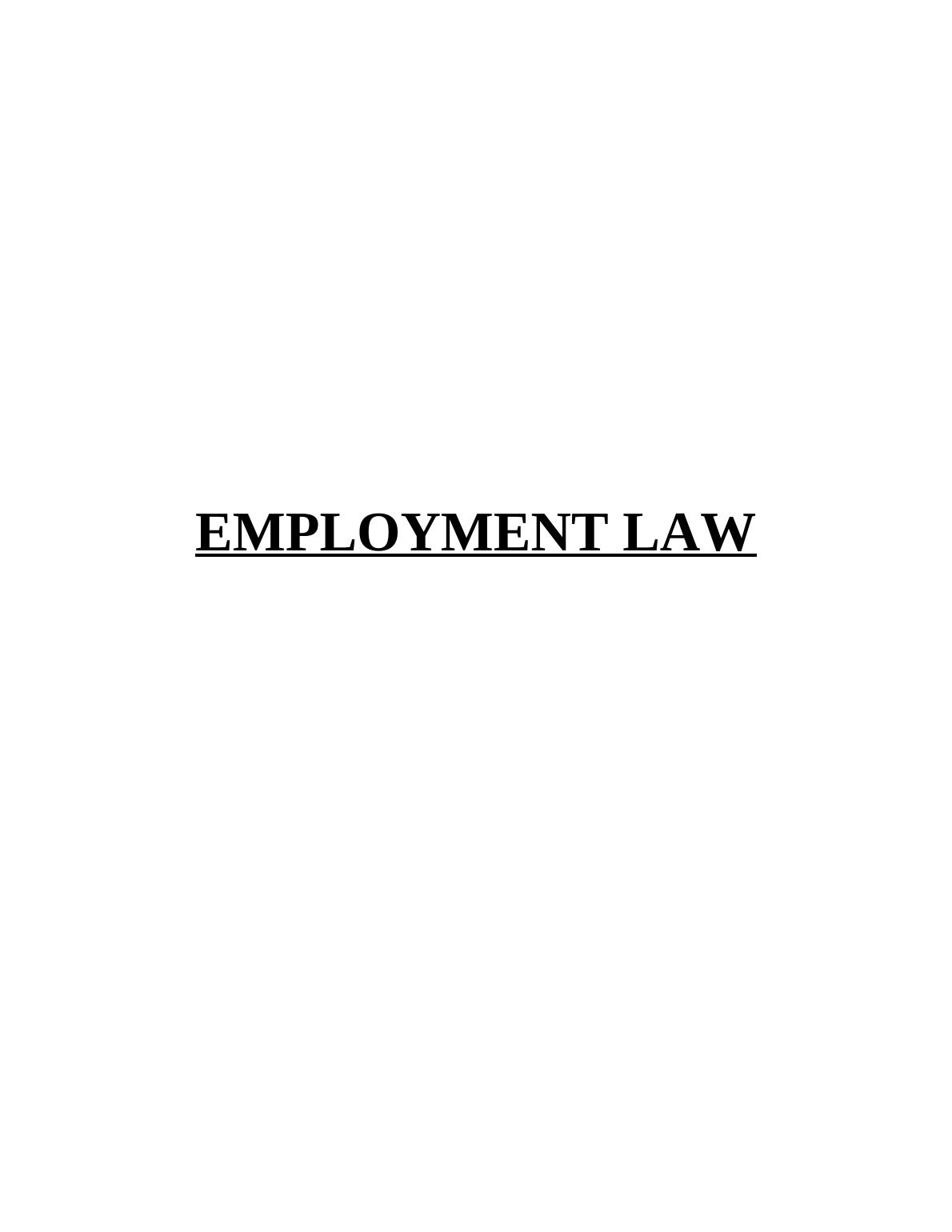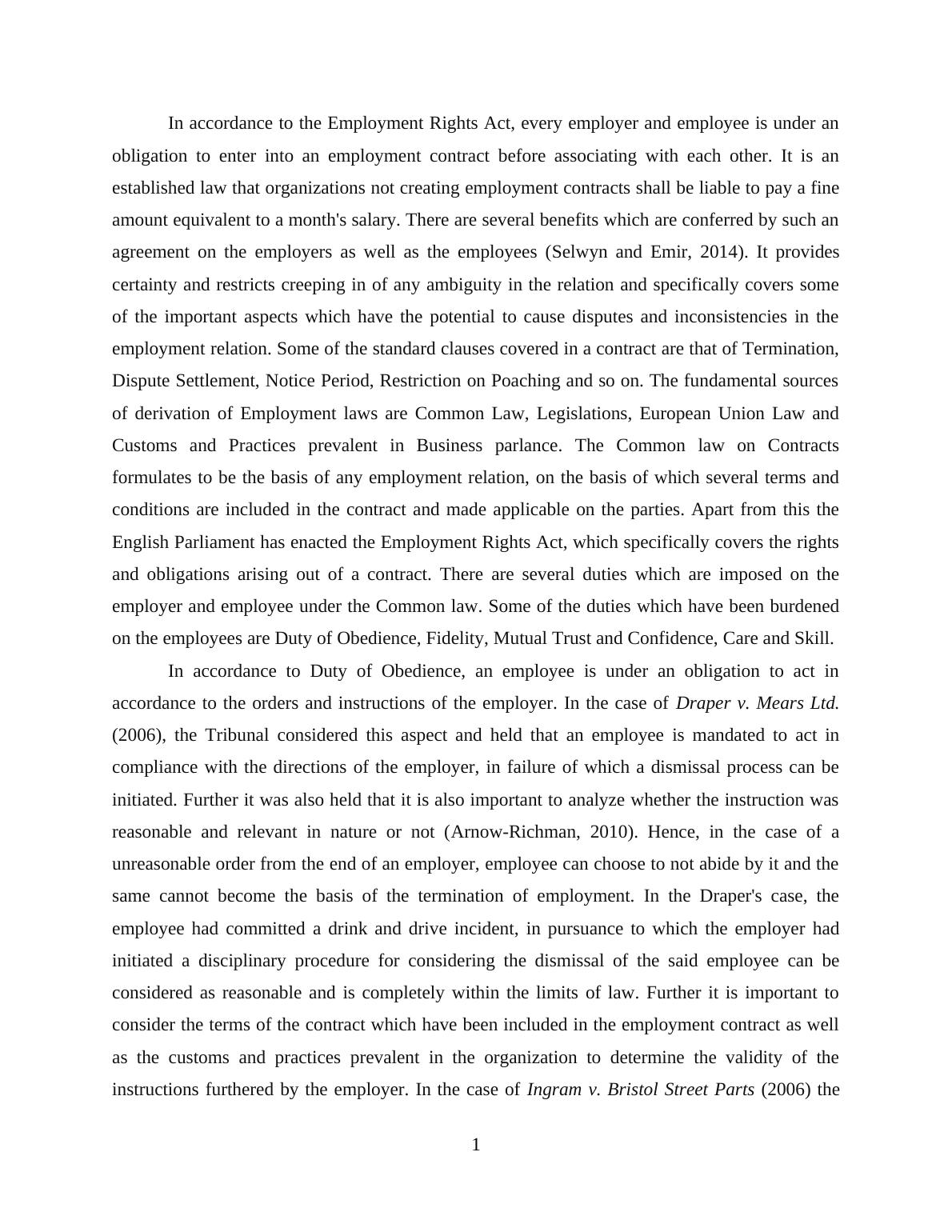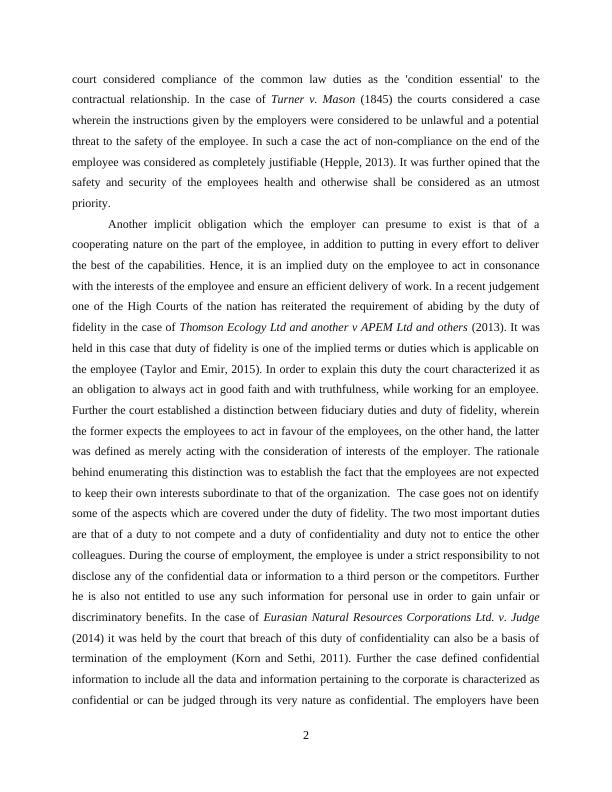Ask a question from expert
Employment Law - Employment Rights Act
7 Pages2900 Words274 Views
Added on 2019-12-28
Employment Law - Employment Rights Act
Added on 2019-12-28
BookmarkShareRelated Documents
EMPLOYMENT LAW

In accordance to the Employment Rights Act, every employer and employee is under anobligation to enter into an employment contract before associating with each other. It is anestablished law that organizations not creating employment contracts shall be liable to pay a fineamount equivalent to a month's salary. There are several benefits which are conferred by such anagreement on the employers as well as the employees (Selwyn and Emir, 2014). It providescertainty and restricts creeping in of any ambiguity in the relation and specifically covers someof the important aspects which have the potential to cause disputes and inconsistencies in theemployment relation. Some of the standard clauses covered in a contract are that of Termination,Dispute Settlement, Notice Period, Restriction on Poaching and so on. The fundamental sourcesof derivation of Employment laws are Common Law, Legislations, European Union Law andCustoms and Practices prevalent in Business parlance. The Common law on Contractsformulates to be the basis of any employment relation, on the basis of which several terms andconditions are included in the contract and made applicable on the parties. Apart from this theEnglish Parliament has enacted the Employment Rights Act, which specifically covers the rightsand obligations arising out of a contract. There are several duties which are imposed on theemployer and employee under the Common law. Some of the duties which have been burdenedon the employees are Duty of Obedience, Fidelity, Mutual Trust and Confidence, Care and Skill. In accordance to Duty of Obedience, an employee is under an obligation to act inaccordance to the orders and instructions of the employer. In the case of Draper v. Mears Ltd.(2006), the Tribunal considered this aspect and held that an employee is mandated to act incompliance with the directions of the employer, in failure of which a dismissal process can beinitiated. Further it was also held that it is also important to analyze whether the instruction wasreasonable and relevant in nature or not (Arnow-Richman, 2010). Hence, in the case of aunreasonable order from the end of an employer, employee can choose to not abide by it and thesame cannot become the basis of the termination of employment. In the Draper's case, theemployee had committed a drink and drive incident, in pursuance to which the employer hadinitiated a disciplinary procedure for considering the dismissal of the said employee can beconsidered as reasonable and is completely within the limits of law. Further it is important toconsider the terms of the contract which have been included in the employment contract as wellas the customs and practices prevalent in the organization to determine the validity of theinstructions furthered by the employer. In the case of Ingram v. Bristol Street Parts (2006) the1

court considered compliance of the common law duties as the 'condition essential' to thecontractual relationship. In the case of Turner v. Mason (1845) the courts considered a casewherein the instructions given by the employers were considered to be unlawful and a potentialthreat to the safety of the employee. In such a case the act of non-compliance on the end of theemployee was considered as completely justifiable (Hepple, 2013). It was further opined that thesafety and security of the employees health and otherwise shall be considered as an utmostpriority. Another implicit obligation which the employer can presume to exist is that of acooperating nature on the part of the employee, in addition to putting in every effort to deliverthe best of the capabilities. Hence, it is an implied duty on the employee to act in consonancewith the interests of the employee and ensure an efficient delivery of work. In a recent judgementone of the High Courts of the nation has reiterated the requirement of abiding by the duty offidelity in the case of Thomson Ecology Ltd and another v APEM Ltd and others (2013). It washeld in this case that duty of fidelity is one of the implied terms or duties which is applicable onthe employee (Taylor and Emir, 2015). In order to explain this duty the court characterized it asan obligation to always act in good faith and with truthfulness, while working for an employee.Further the court established a distinction between fiduciary duties and duty of fidelity, whereinthe former expects the employees to act in favour of the employees, on the other hand, the latterwas defined as merely acting with the consideration of interests of the employer. The rationalebehind enumerating this distinction was to establish the fact that the employees are not expectedto keep their own interests subordinate to that of the organization. The case goes not on identifysome of the aspects which are covered under the duty of fidelity. The two most important dutiesare that of a duty to not compete and a duty of confidentiality and duty not to entice the othercolleagues. During the course of employment, the employee is under a strict responsibility to notdisclose any of the confidential data or information to a third person or the competitors. Furtherhe is also not entitled to use any such information for personal use in order to gain unfair ordiscriminatory benefits. In the case of Eurasian Natural Resources Corporations Ltd. v. Judge(2014) it was held by the court that breach of this duty of confidentiality can also be a basis oftermination of the employment (Korn and Sethi, 2011). Further the case defined confidentialinformation to include all the data and information pertaining to the corporate is characterized asconfidential or can be judged through its very nature as confidential. The employers have been2

End of preview
Want to access all the pages? Upload your documents or become a member.
Related Documents
Employment Law | Assignmentlg...
|10
|2164
|22
Wrongful Dismissal under Common Law - Deskliblg...
|5
|1314
|360
Employment Law Advice for Employees: Understanding the Rights and Provisions Regarding Dismissallg...
|7
|1369
|423
Assignment on Employment law (Pdf)lg...
|14
|3121
|37
Agency Law and Liability: A Case Study on Steve and Biancalg...
|6
|1943
|301
Isobel's Claim of Unfair Dismissal and Termination by Barrylg...
|9
|2116
|246